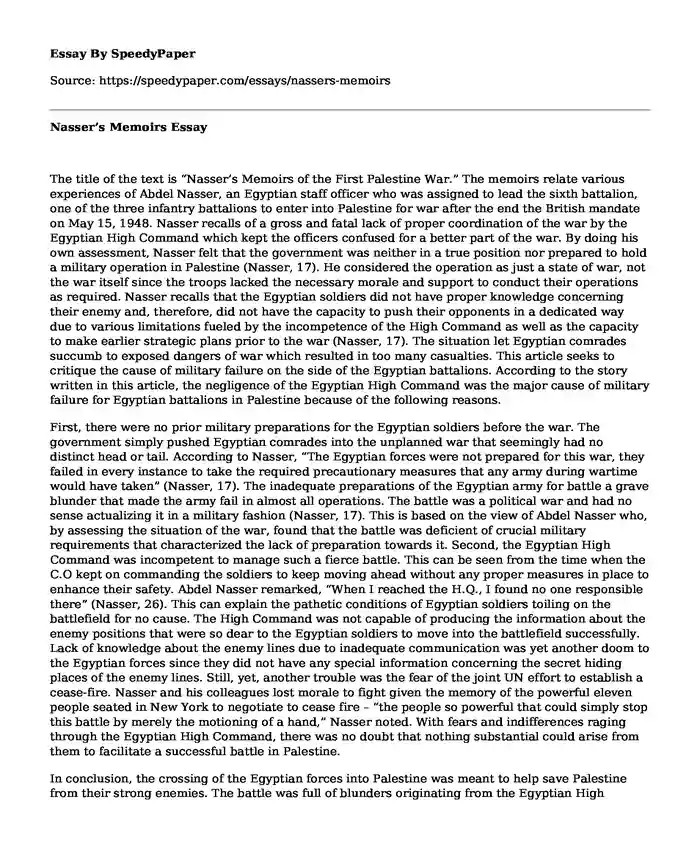The title of the text is "Nasser's Memoirs of the First Palestine War." The memoirs relate various experiences of Abdel Nasser, an Egyptian staff officer who was assigned to lead the sixth battalion, one of the three infantry battalions to enter into Palestine for war after the end the British mandate on May 15, 1948. Nasser recalls of a gross and fatal lack of proper coordination of the war by the Egyptian High Command which kept the officers confused for a better part of the war. By doing his own assessment, Nasser felt that the government was neither in a true position nor prepared to hold a military operation in Palestine (Nasser, 17). He considered the operation as just a state of war, not the war itself since the troops lacked the necessary morale and support to conduct their operations as required. Nasser recalls that the Egyptian soldiers did not have proper knowledge concerning their enemy and, therefore, did not have the capacity to push their opponents in a dedicated way due to various limitations fueled by the incompetence of the High Command as well as the capacity to make earlier strategic plans prior to the war (Nasser, 17). The situation let Egyptian comrades succumb to exposed dangers of war which resulted in too many casualties. This article seeks to critique the cause of military failure on the side of the Egyptian battalions. According to the story written in this article, the negligence of the Egyptian High Command was the major cause of military failure for Egyptian battalions in Palestine because of the following reasons.
First, there were no prior military preparations for the Egyptian soldiers before the war. The government simply pushed Egyptian comrades into the unplanned war that seemingly had no distinct head or tail. According to Nasser, "The Egyptian forces were not prepared for this war, they failed in every instance to take the required precautionary measures that any army during wartime would have taken" (Nasser, 17). The inadequate preparations of the Egyptian army for battle a grave blunder that made the army fail in almost all operations. The battle was a political war and had no sense actualizing it in a military fashion (Nasser, 17). This is based on the view of Abdel Nasser who, by assessing the situation of the war, found that the battle was deficient of crucial military requirements that characterized the lack of preparation towards it. Second, the Egyptian High Command was incompetent to manage such a fierce battle. This can be seen from the time when the C.O kept on commanding the soldiers to keep moving ahead without any proper measures in place to enhance their safety. Abdel Nasser remarked, "When I reached the H.Q., I found no one responsible there" (Nasser, 26). This can explain the pathetic conditions of Egyptian soldiers toiling on the battlefield for no cause. The High Command was not capable of producing the information about the enemy positions that were so dear to the Egyptian soldiers to move into the battlefield successfully. Lack of knowledge about the enemy lines due to inadequate communication was yet another doom to the Egyptian forces since they did not have any special information concerning the secret hiding places of the enemy lines. Still, yet, another trouble was the fear of the joint UN effort to establish a cease-fire. Nasser and his colleagues lost morale to fight given the memory of the powerful eleven people seated in New York to negotiate to cease fire - "the people so powerful that could simply stop this battle by merely the motioning of a hand," Nasser noted. With fears and indifferences raging through the Egyptian High Command, there was no doubt that nothing substantial could arise from them to facilitate a successful battle in Palestine.
In conclusion, the crossing of the Egyptian forces into Palestine was meant to help save Palestine from their strong enemies. The battle was full of blunders originating from the Egyptian High Command that was responsible for coordinating and facilitating the battle. The High Command was characterized with incompetence and negligence gave that they could not afford to give proper directions and support services to soldiers in the battlefield to enhance coherence and proper flow of events. The war led to the terrible failure of the Egyptian army with numerous casualties and destruction of military equipment. This document is very significant to the study of world history since it acts as the revelation of the consequences of war on nations especially the developing nations in the world. This document also provides proof that global unity and interconnectivity is the core way of quenching major wars that are very lethal to the economy of nations. The United Nations, for example, played a crucial role in restoring peace at the Palestine frontier over the fierce exchange of fire among the neighbor countries - Palestine and Israel.
Work Cited
Nasser, Gamal Abdul, and Walid Khalidi. "Nasser's Memoirs of the First Palestine War." Journal of Palestine Studies 2.2 (1973): 3-32.
Cite this page
Nasser's Memoirs. (2023, Jan 10). Retrieved from https://speedypaper.net/essays/nassers-memoirs
Request Removal
If you are the original author of this essay and no longer wish to have it published on the SpeedyPaper website, please click below to request its removal:
- The American Judicial Process: Wrongful Convictions. Law Essay Example.
- Scholarship Essay Sample to the National Health Service Corp
- Essay Sample with a Business Plan: Redefining Hydration
- Never Let Me Go by Kazuo Ishiguro. Free Essay.
- Marketing Essay Example: Differentiation Strategy in Competitive Advantage
- The Role of Ethics in a Hospital Setting as a Nurse, Free Essay for Everyone
- Essay Sample on Pharmaceutical Pricing
Popular categories





